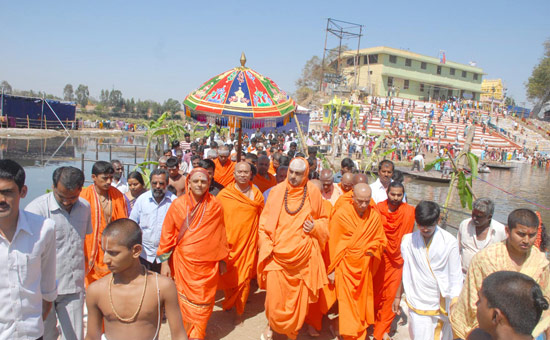-
This
article gives a brief history about Kumbha Mela of Tirumakudalu Shree Kshetra
in Karnataka. In 2019 it will be held from 17-19 February.
Kumbhamela,
a traditional ritual of taking a holy plunge at the confluence of Trio Rivers
has been in practice from time immemorial in India. A large number of devotees
perform the ritual in the confluence of the rivers in the places such as
Prayaga, Haridwra, Nasika, Ujjayini and other places in northern part of the
country.
 Seers entering the confluence
Seers entering the confluence
In an
effort to facilitate this tradition for regional devotees, seers of different
mutts of the region have been successfully organising Kumbhamela in
Tirumakudalu Narasipura, a confluence of the rivers Cauvery, Kapila and
Sphataka Sarovara (Gupthagamini) which belongs to Mysuru district of Karnataka
State.
The
founder organisers of the Kumbhamela are Shree Kailasaashrama Shree Tiruchchi
Mahaswamiji, Shree Adichunchanagiri Mutt seer Padmabhushan Dr Shree
Balagangadharanatha Swamiji, Sri Sutturu Veerasinhasana Mahasansthana mutt seer
Shree Shivarathri Desheekendra Swamiji, Shree Avadhootadatta peetha seer Shree
Ganapathy Sachchidananda Swamiji of Mysuru and Shree Onkarashrama Mahasansthana
Shree Shivapuri Swamiji.
The first
Kumbhamela was conducted in the year 1989 and since then ten Kumbhamelas were
held in 1992, 1995, 1998, 2001, 2004, 2007, 2010, 2013, and in the year 2016
consecutively.
Considered
to be one of the popular religious ceremonies in the South India, the eleventh
Kumbha Mela is scheduled to be held from 17-19th February in the
Shreevilambi Nama Sanvatsara at Shreekshetra Triveni Sangama.
Significant religious places: Shree Agasteshwaraswamy temple shaped by Shree
Sage Agasteswara, Shree Gunjanarasimhaswami by installing Linga using sand and Shree
Hanumantheshwara temple.
 Overview of river with devotees.
Overview of river with devotees.
About the holy place: It has been considered as equal to the Kumbhamela that takes place on
the banks of river Ganga. The historical and places of worship such as Shree
Bharadwaja Rishyaashrama, Shree Chaudeshwari Devashtaana Rudrapada, Akshayavata
Vriksha, Ashwatha Vriksha, Vyasaraja mutt and other places have increased the
religious value of the place.
Time for the sacred bath: The Muhurtha fixed has been considered to be very sacred this year too.
Moreover, the traditional extravaganza, which takes place once in every three
years. Devotees from all sections of society take part in this Kumbha Mela.
Do read Finally
South Indians get their own Kumbha Mela published in Hinduism Today
Excerpts “Three hundred thousand grateful Hindus fulfilled their spiritual aspirations by participating in the third Dakshna (Southern) Kumbha Mela February 13th to 15th, 1995. Until just six years ago, each would have had to trek 1,000 miles north to join one of the four tri-annual Kumbha Melas. But thanks to the innovation and blessing of South India's religious leaders, pilgrims needed journey only to Triveni Sangam near Mysore, Karnataka, for three days of yajnas, elaborate pujas and the company of saints and holy men.”
“As in previous years, the gracious presence of His Holiness, Jagadguru Sri Sri Sri Thiruchi Mahaswamigal, dressed in white, overshadowed this year's hallowed congregation of saffron-clad sadhus. It was he who conceived this Southern Kumbha Mela following the famous, time-honored Kumbha Melas of the North. On the full-moon day of the 15th, he and the other sadhus were brought in procession to the river bank. Just as he was dismounting from his flower-bedecked truck, the milling throng was treated to a memorable sight. A lone eagle flew near and circled slowly thrice above. The auspicious spectacle of the solitary eagle, his russet wings glinting in the midday sun and his snowy throat setting him off against the blue sky, was received with gasps of delight and wonder by the onlookers.”
“Then
Chief Minister of Karnataka Shri Deva Gowda said, "The sacred roots of the Indian culture and Dharma have gone deep. Dharma is an inherent part of the religious minded people and it greatly influences the behaviors of the society. Our heritage is a radiant model for the whole earth. Democracy can never decay here. The Thiveni Sangam here would soon become one of the biggest religious centers in South India as it is religiously as important as Kasi [Benares]."
Also read
1 Mahagam
festival in Kumbakonam
2 All
you wanted to know about the Kumbha Mela
3 To see over 1400
pictures on Incredible Karnataka
4 Basavanna
and Vir Shaivism Lingayat Movement
5 Understanding
Veerashaivas, Lingayats and Sanatana Dharma